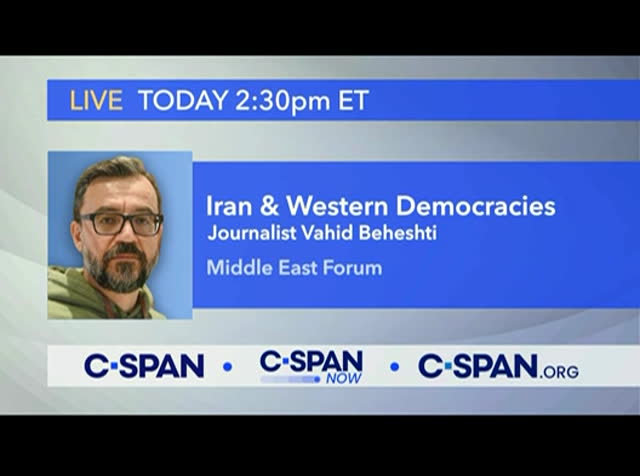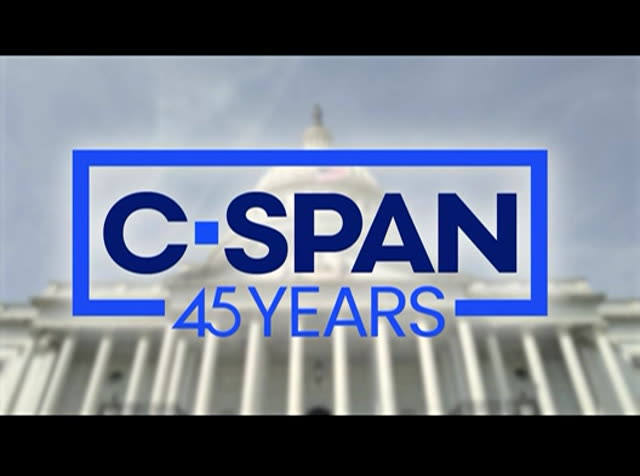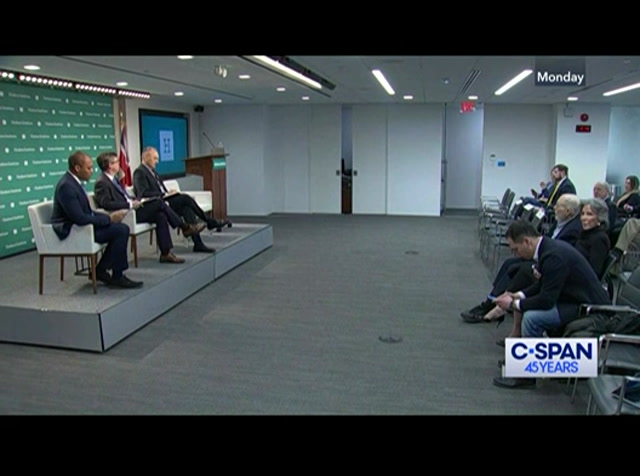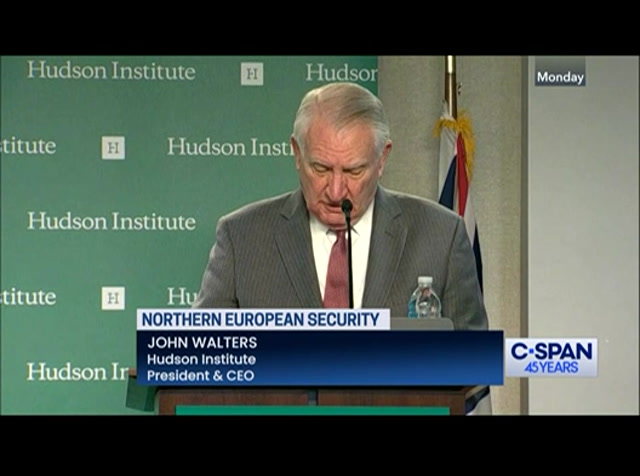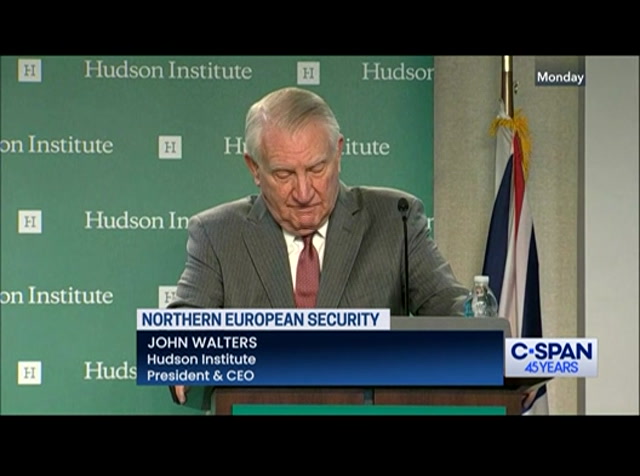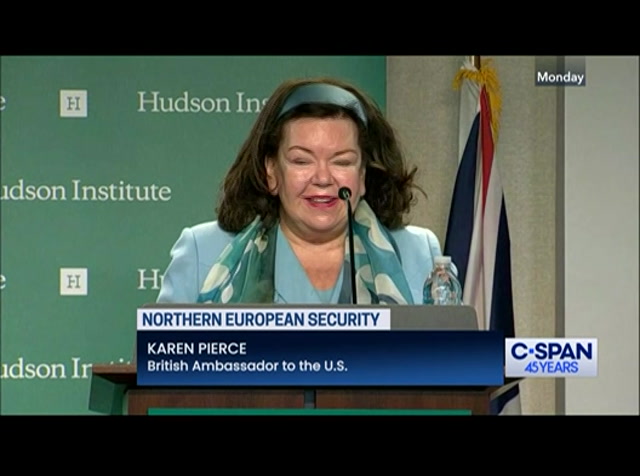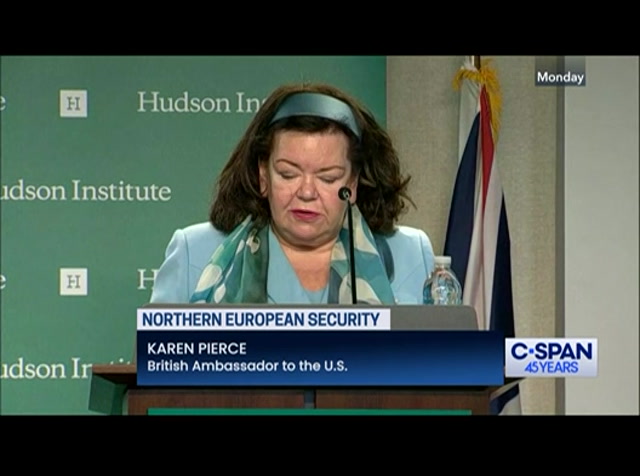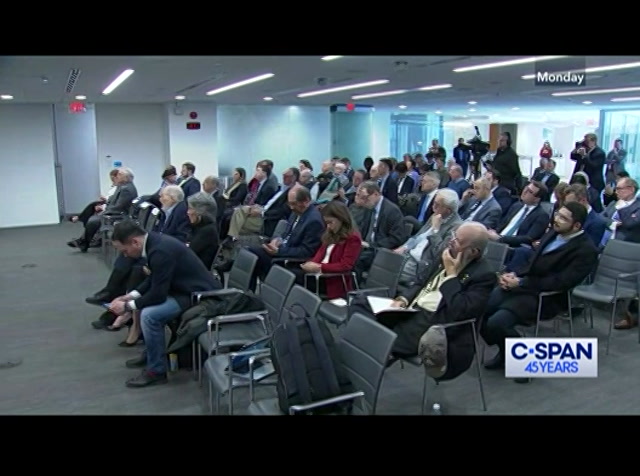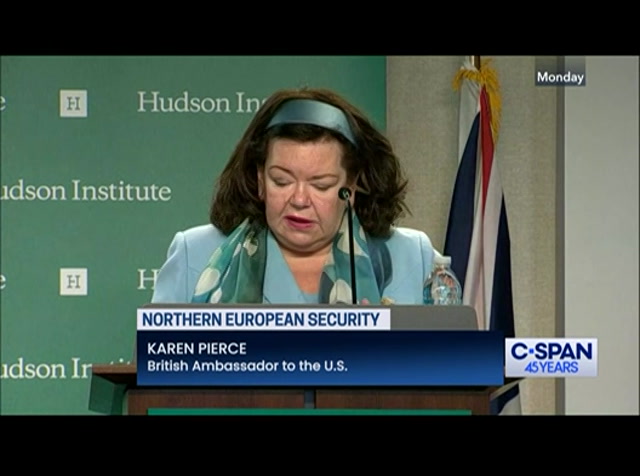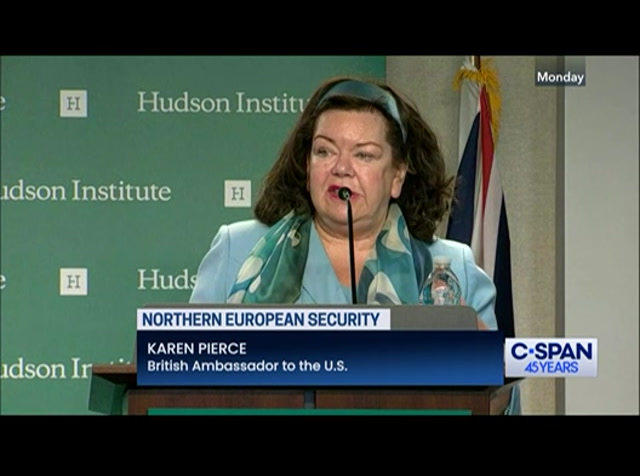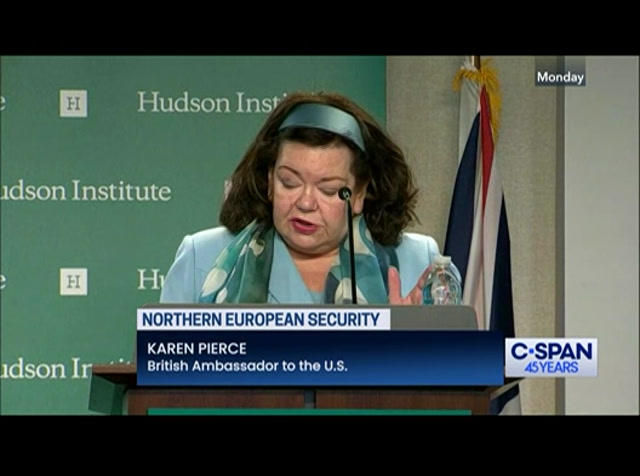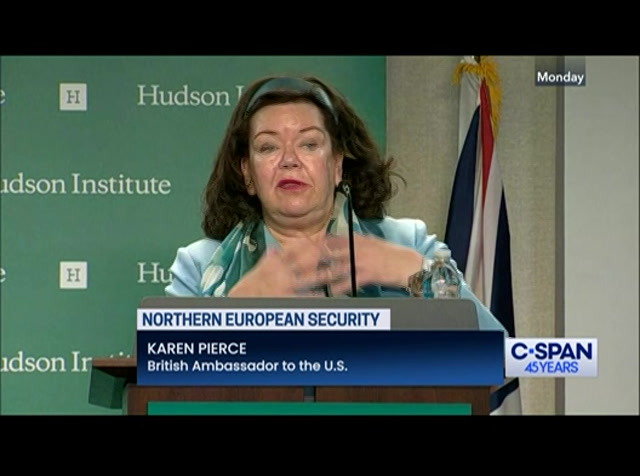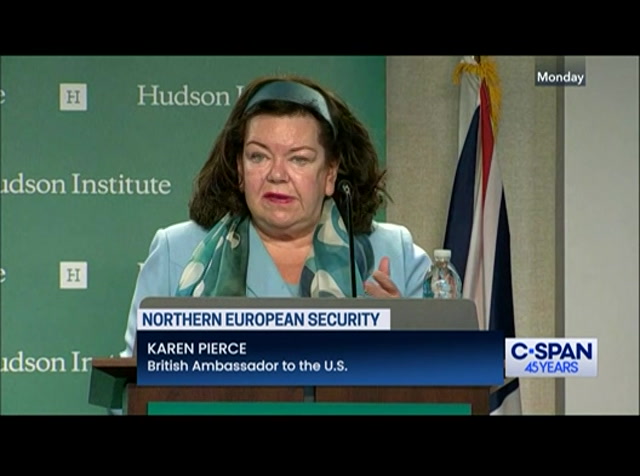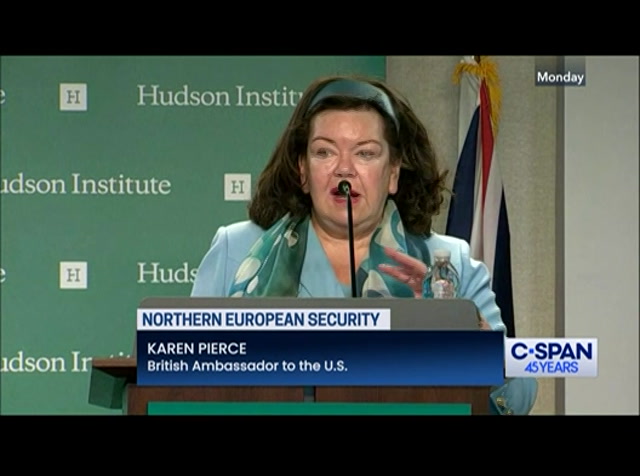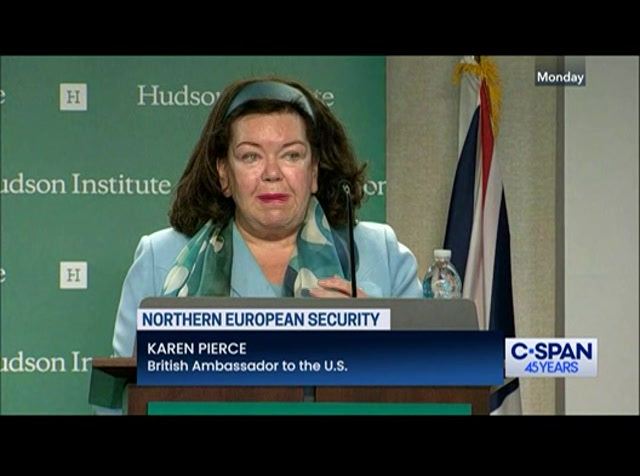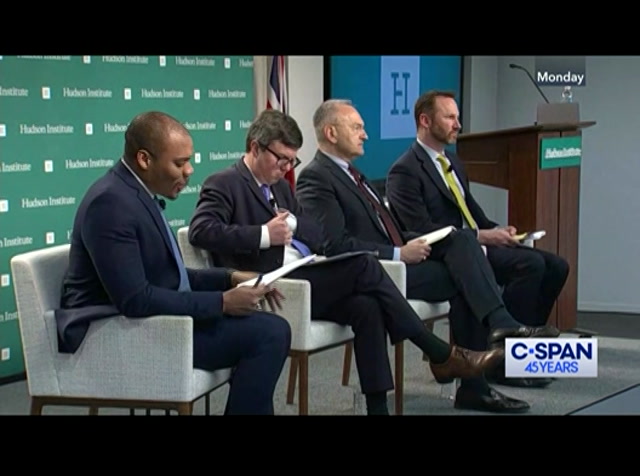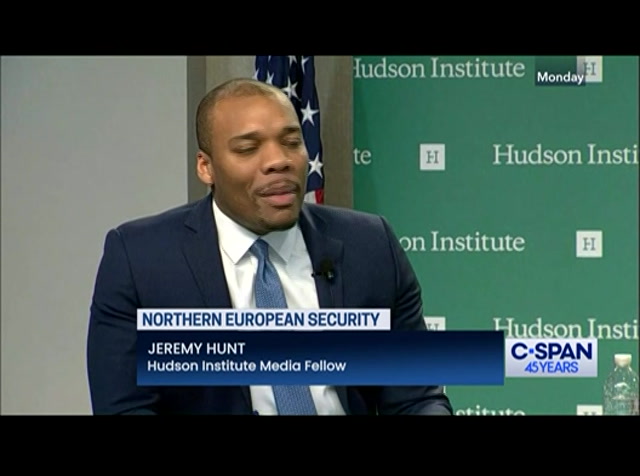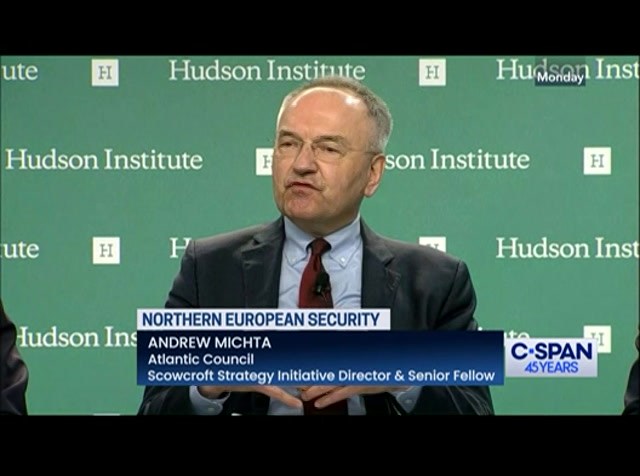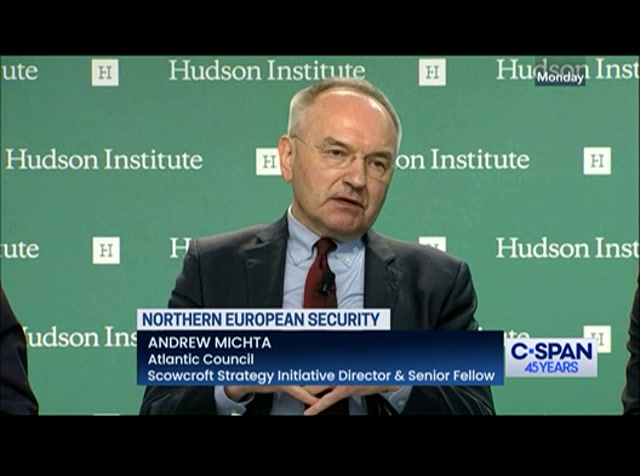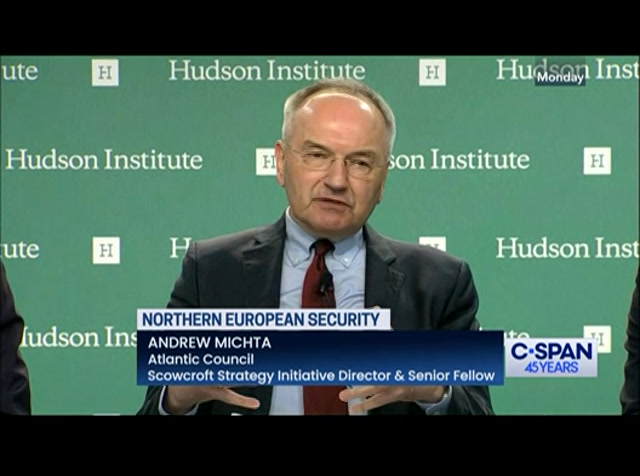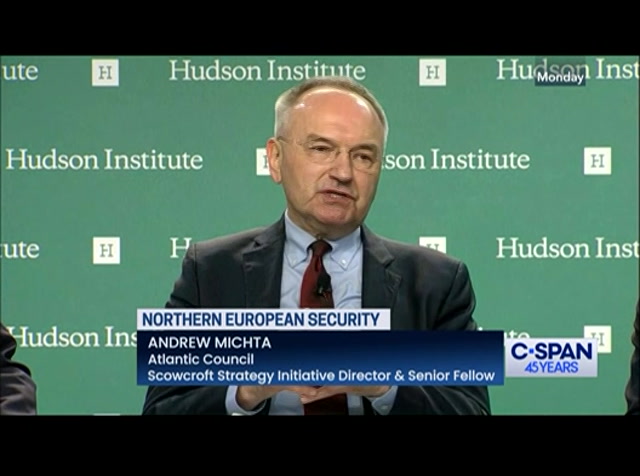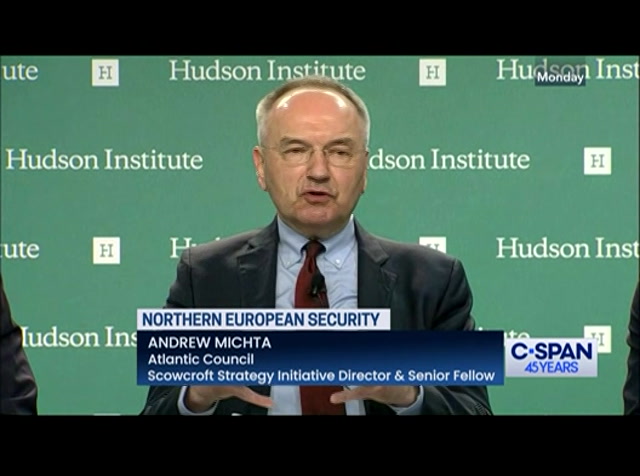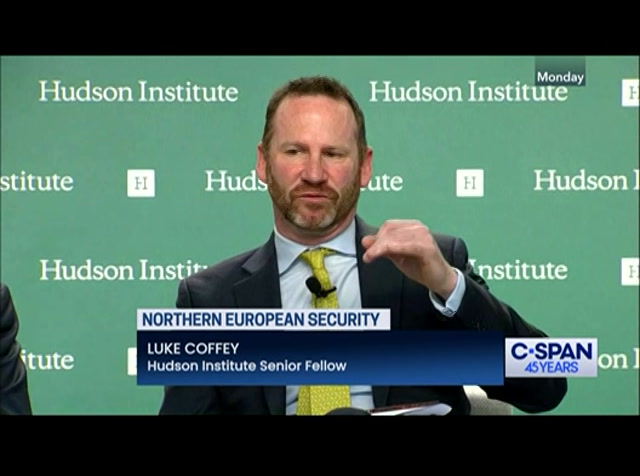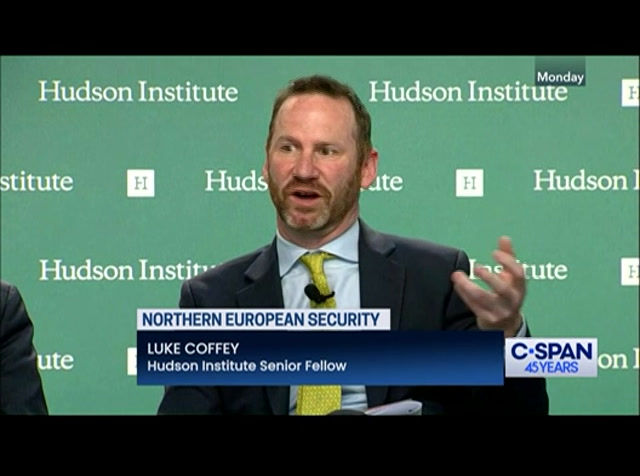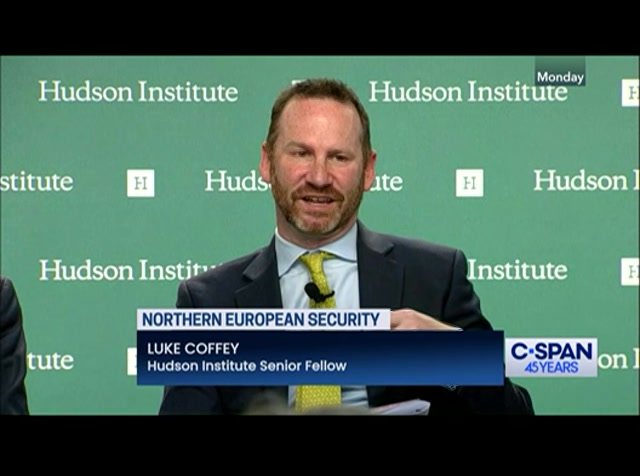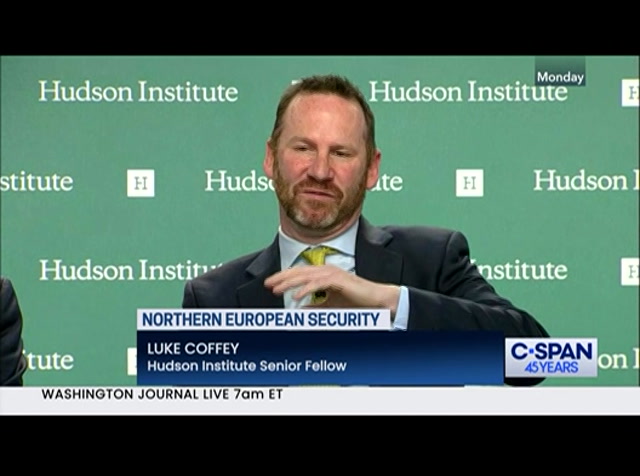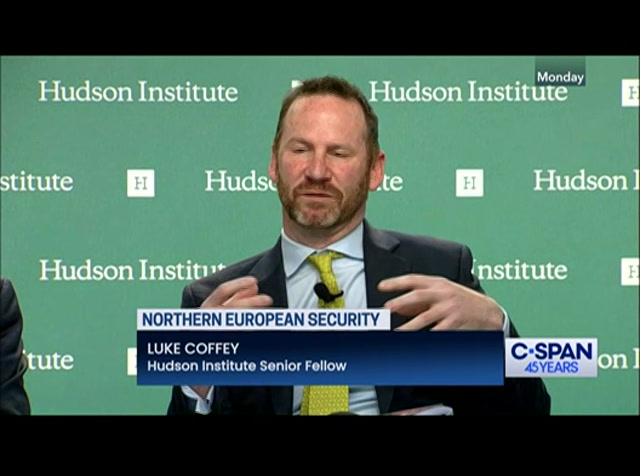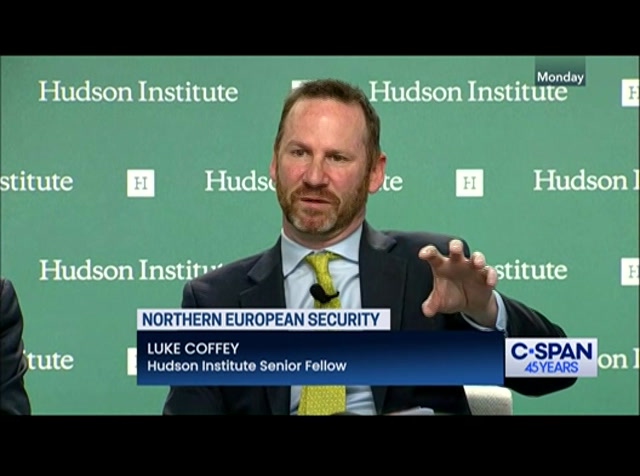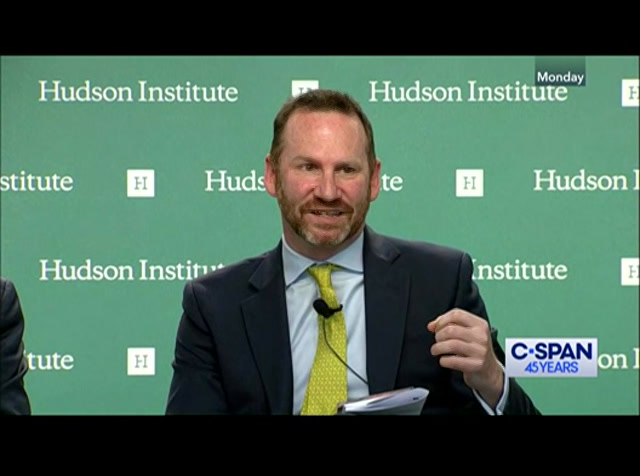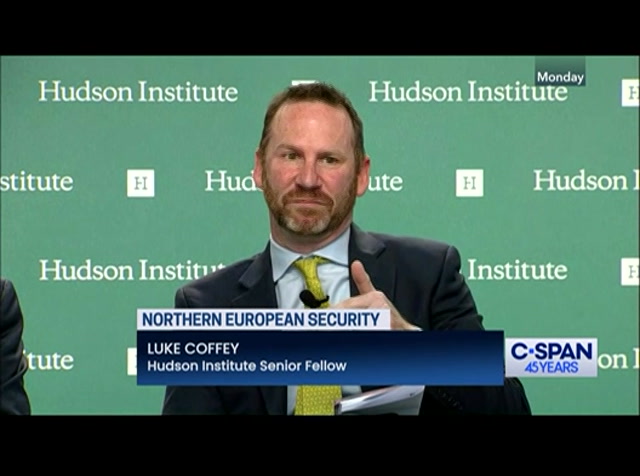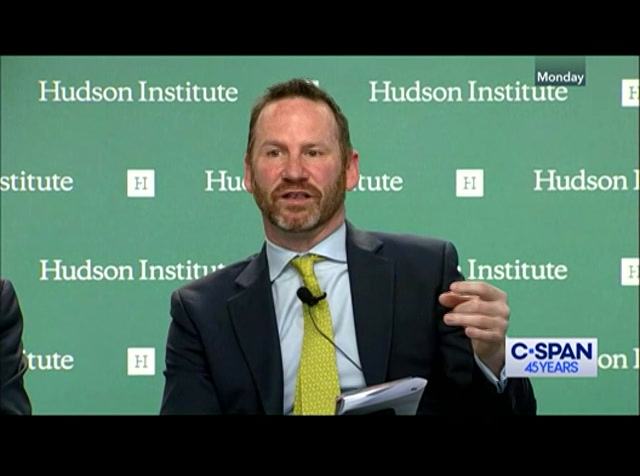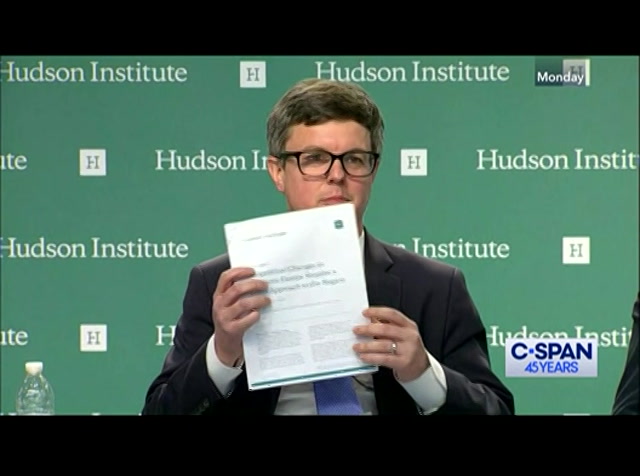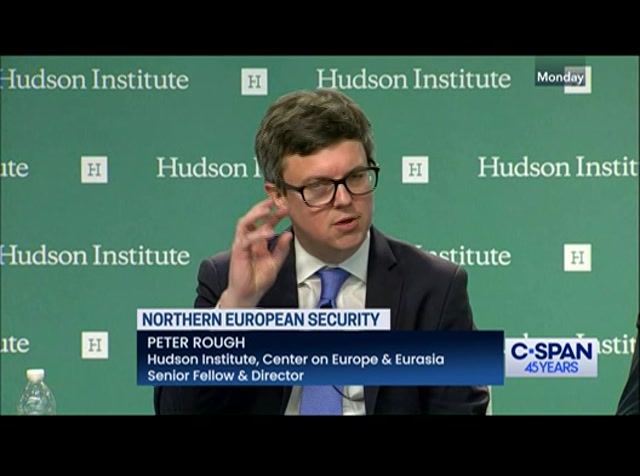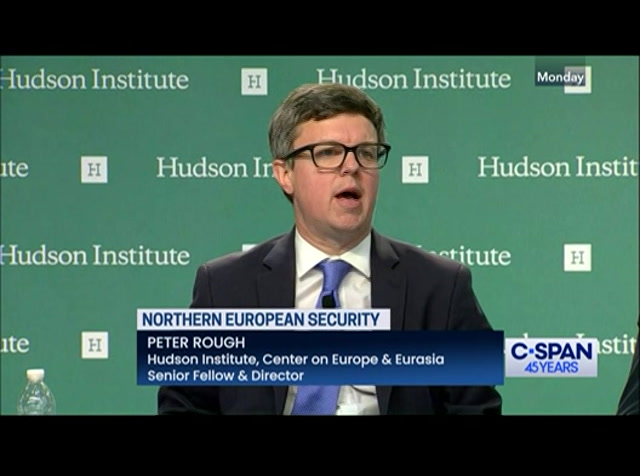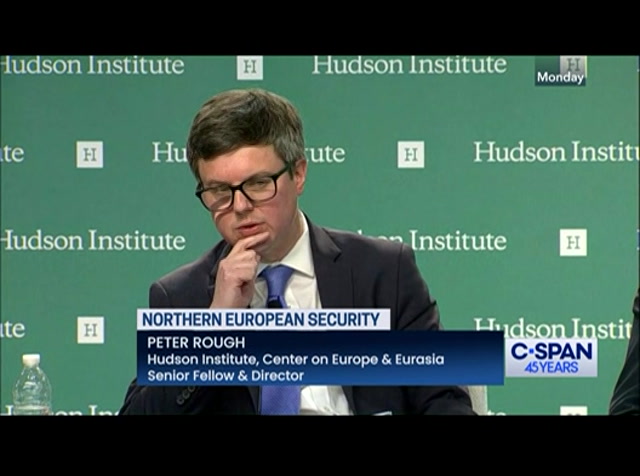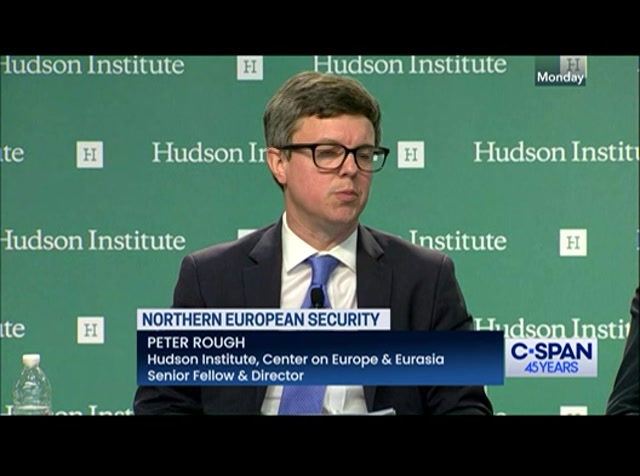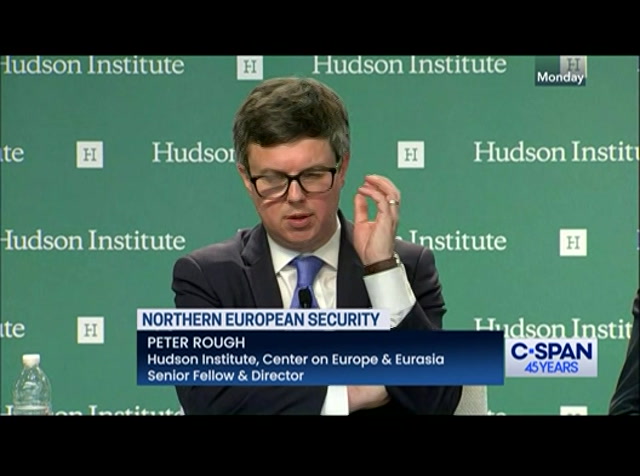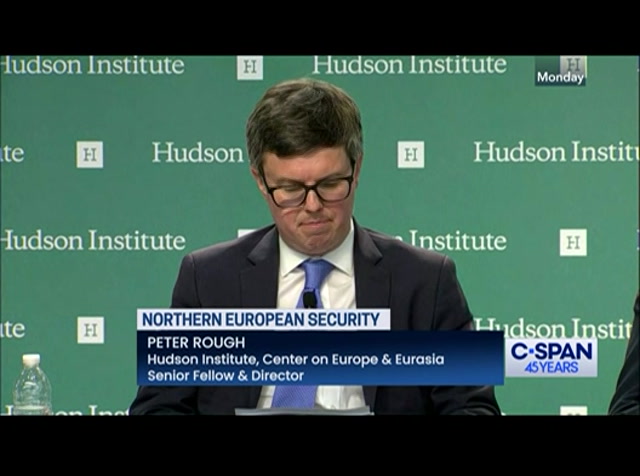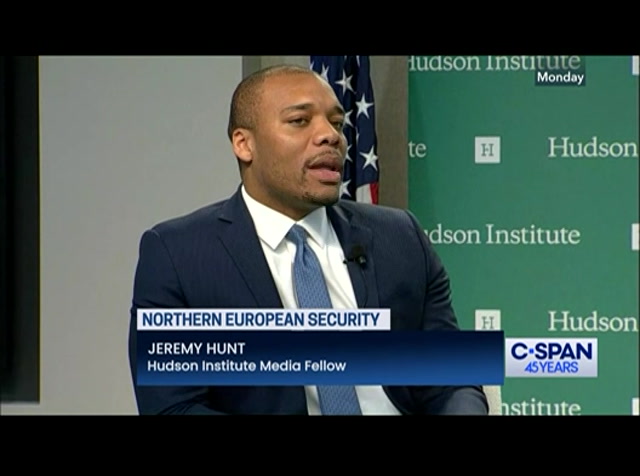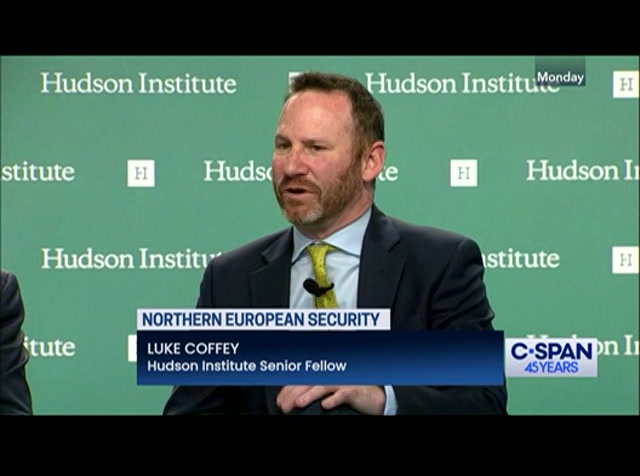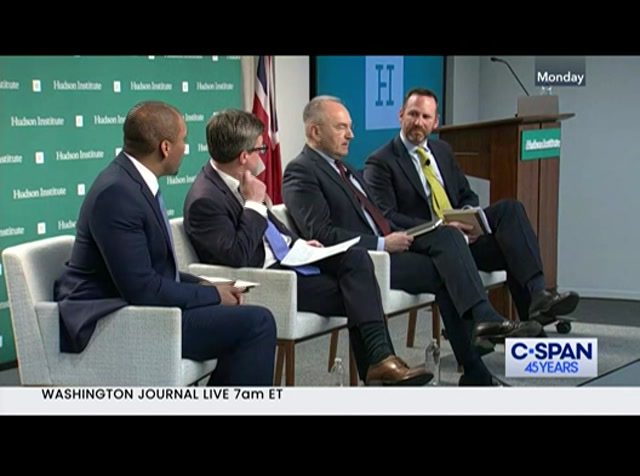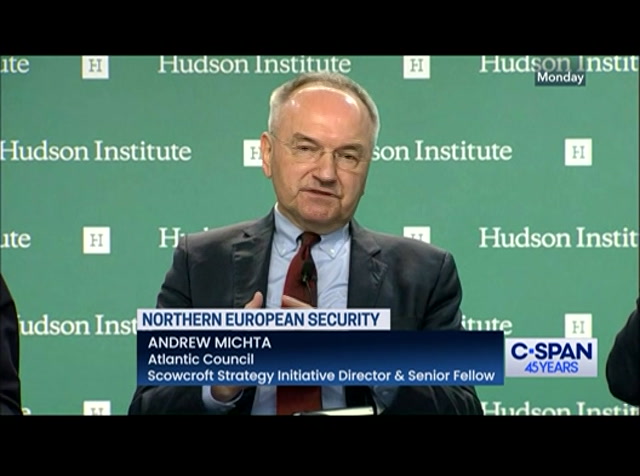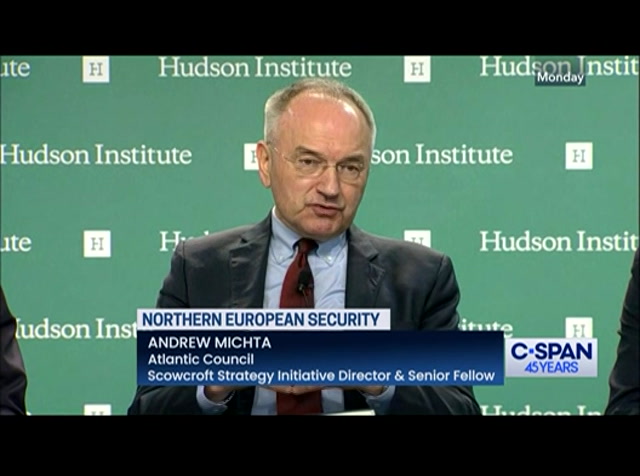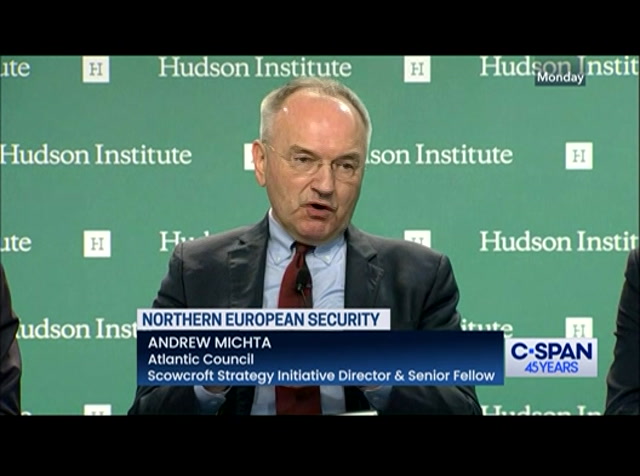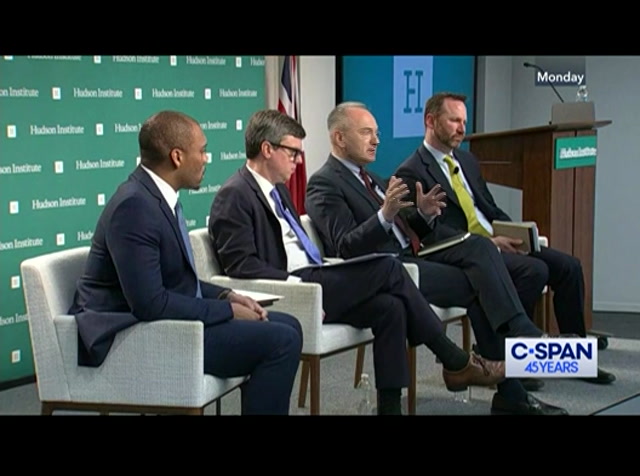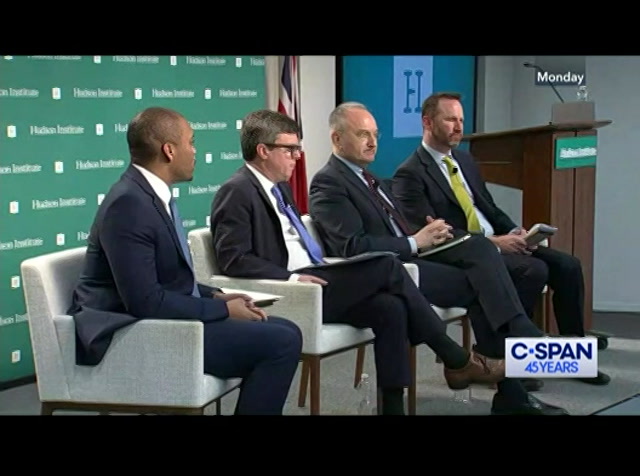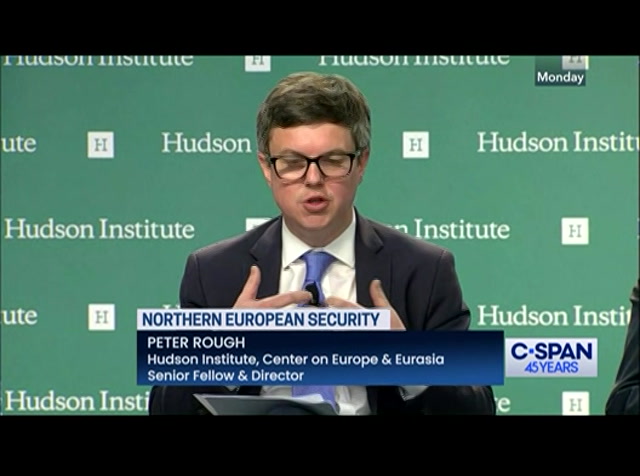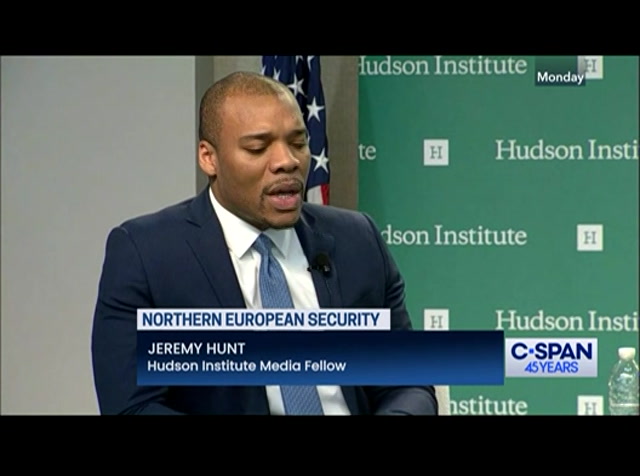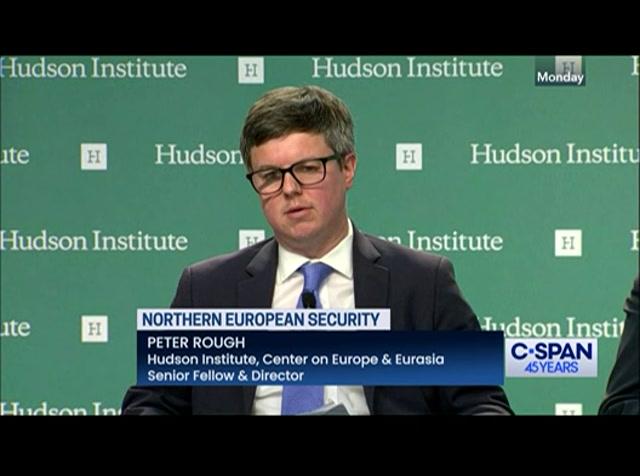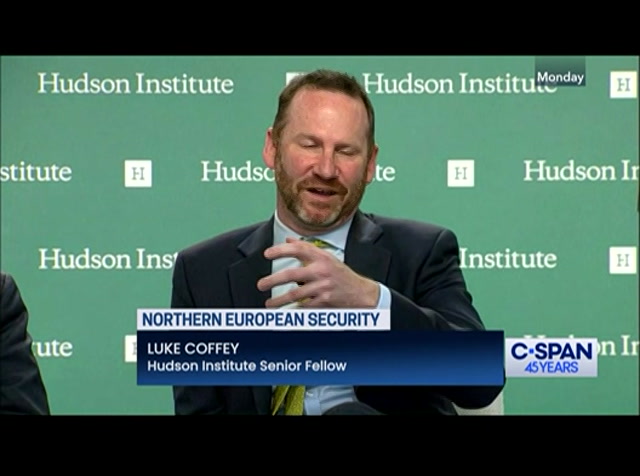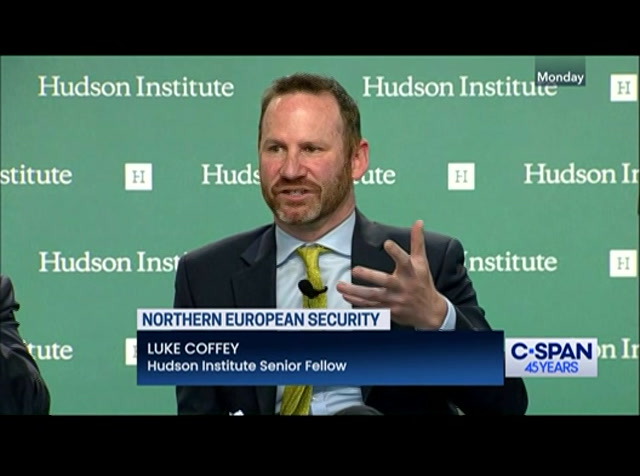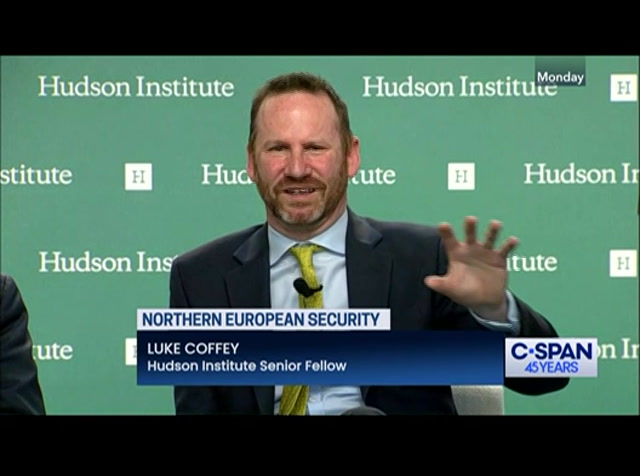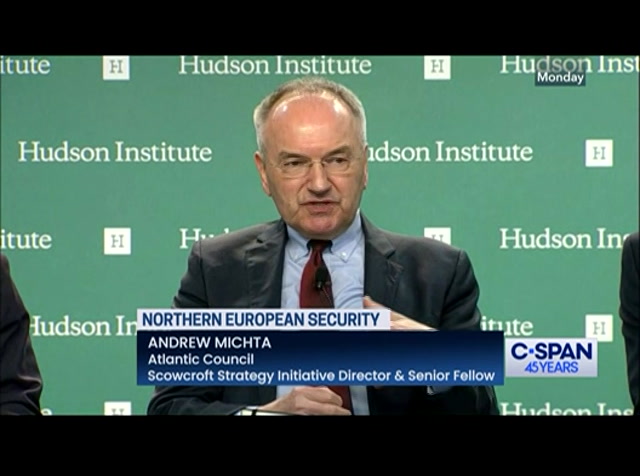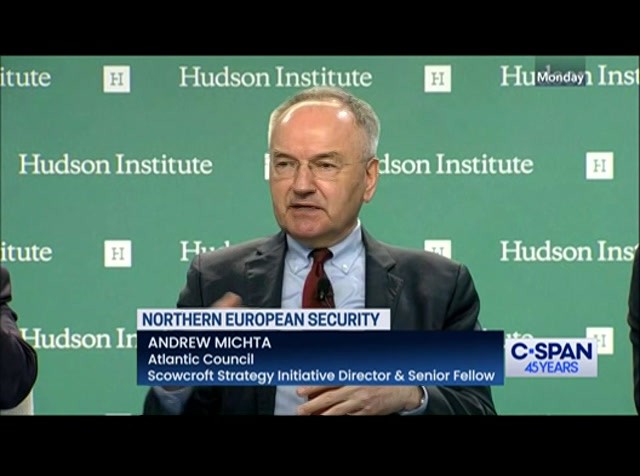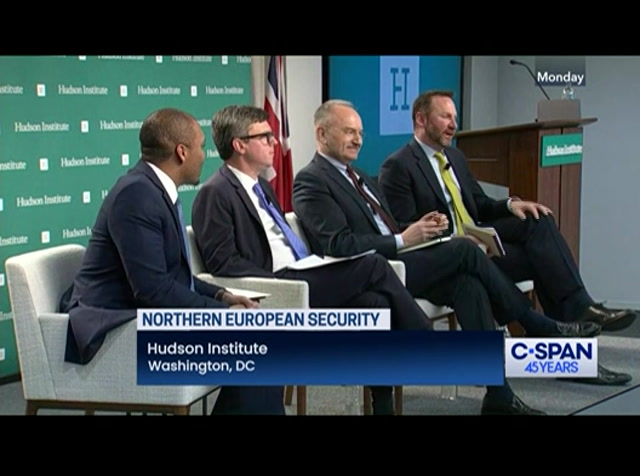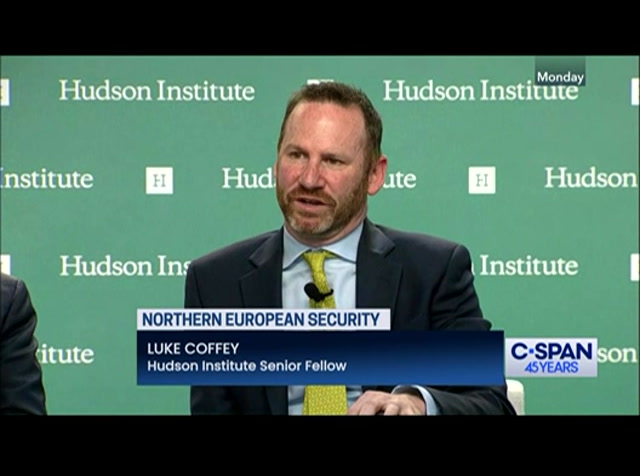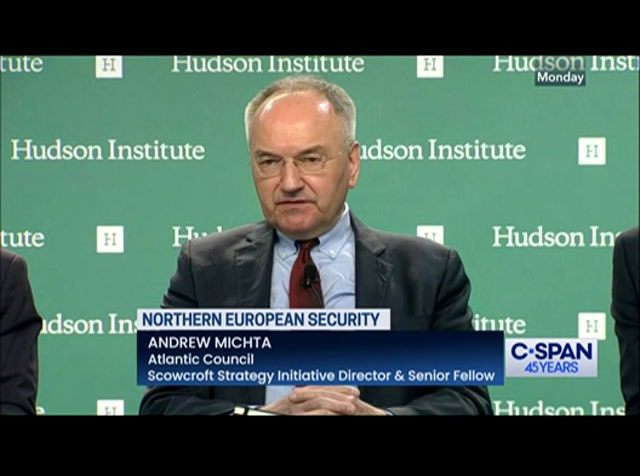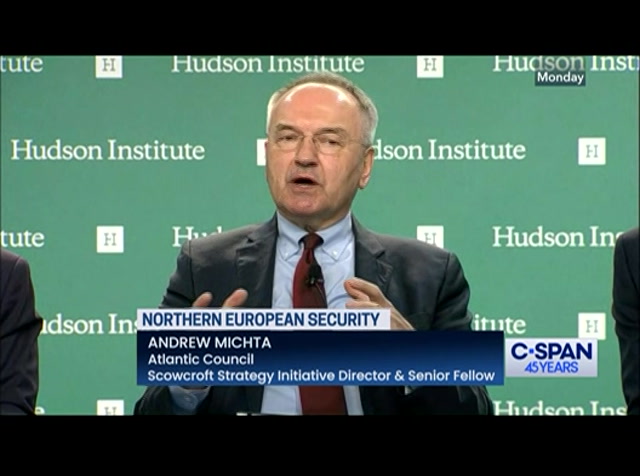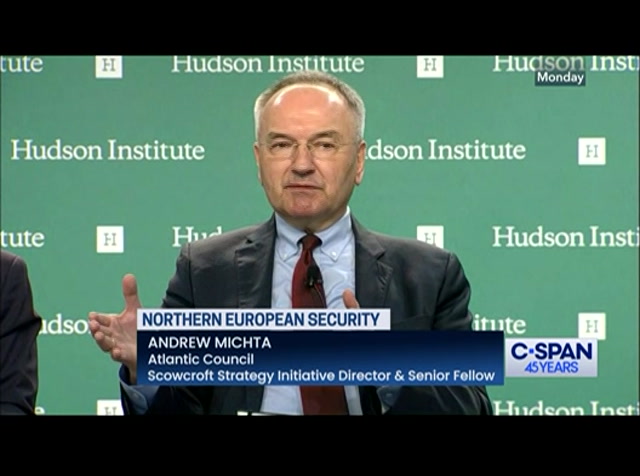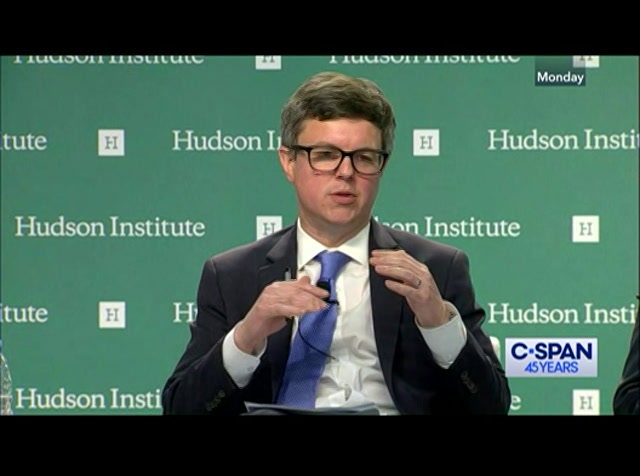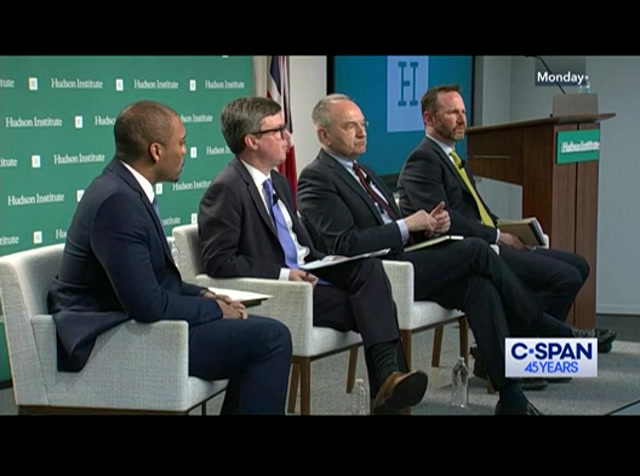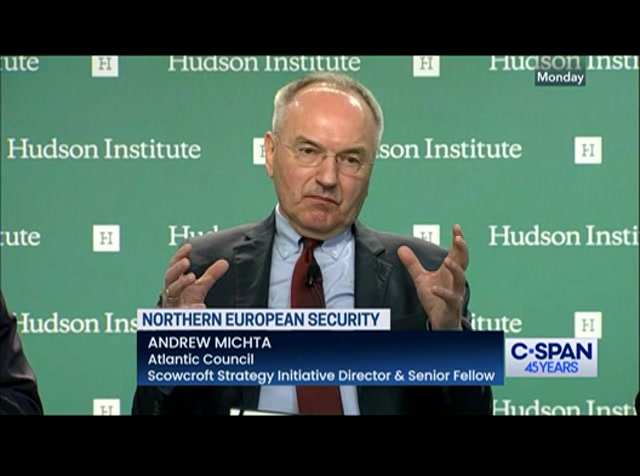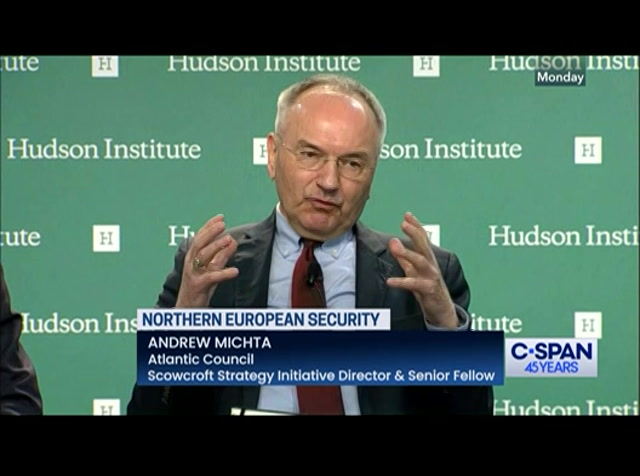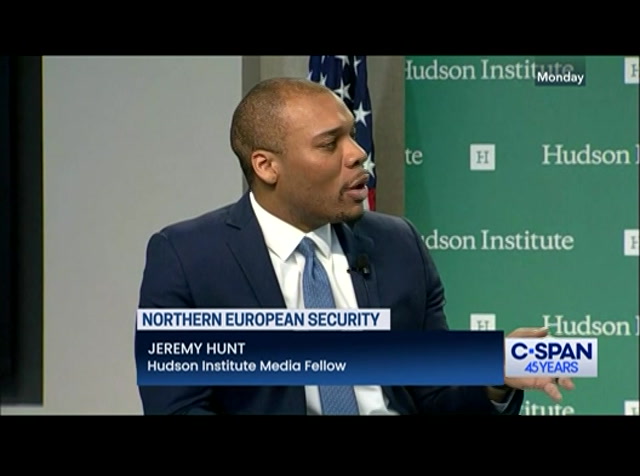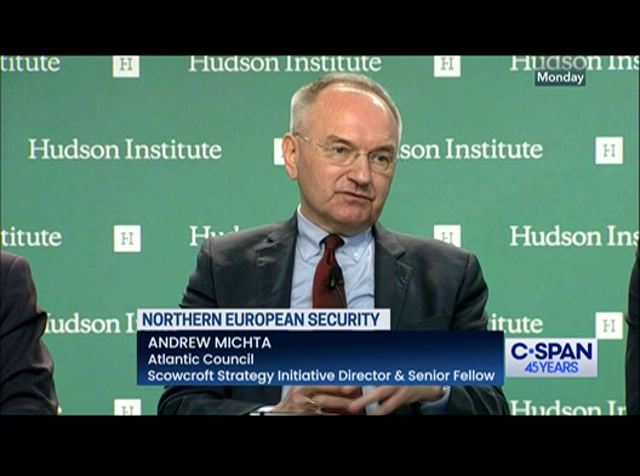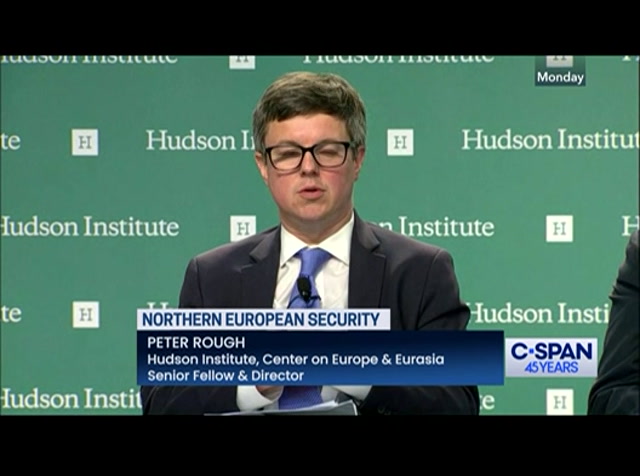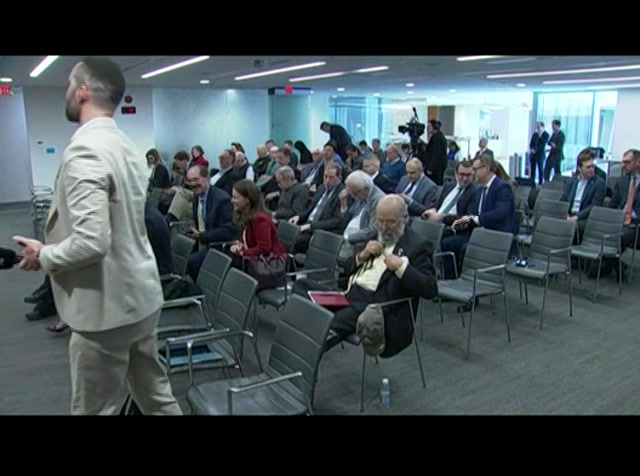tv KCC PART 2 British Ambassador to U.S. Others on Northern European... CSPAN March 28, 2024 4:21am-5:29am EDT
4:23 am
>> permanent representative to the united nations in new york, and has led a distinguished career in foreign and commonwealth office. she has held a number of key leadership positions in her career, and enjoys a sterling reputation in washington, d.c. u.k.'s lucky to have her as its leading representative here. u.k. remains the first ally of the united states. as we set out to defend our interests and strengthen the west and meet the challenges of today and tomorrow. we are like minded friendship
4:24 am
that few countries have had in the world or history. we like to think that hudson is also build ago special relationship to the u.k. thanks to your support, madam ambassador, we have been able to engage in important analysis of the war in ukraine and the european security order order and needs -- order and needs for the future. we are grateful to you and your excellent staff for our friendship. i know it is one of your goals to preserve and strengthen the special relationship. and i can assure you that my team shares that vision. following the ambassador's remarks, we'll go to a panel discussion centered on hudson's new publication with the title, geopolitical changes in northern europe require fresh approach to the region. right now we'll hear from ambassador pierce. madam am mass door, the floor is yours. [applause] -- ambassador, the floor is yours.
4:25 am
ambassador pierce: good morning, everybody. thank you, john, very much for that kind introduction. we take our relationship with hudson incredibly seriously. you and i have had many conversations, including about the balkans. i do think the balkans are relevant here because even as we are focused on the war in ukraine, if we lose what was one of the greatest euro-atlantic foreign policy successes of the 1990's, as a path of putin's ma level lens approach to europe, then a lot of other things i think we will see crumble. i think we should keep that in mind even as we rightly focus on ukraine. we also obviously take the special relationship very seriously. whether you want to use the phrase special relationship or not. i think it's obvious that this is a uniquely propound and
4:26 am
successful bi-- uniquely profound and successful bilateral relationship. it's part of the embassy's task to continue these shared endeavors in war and peace. i served alongside my military and civilians in the balkans and in afghanistan. also to forge new frameworks for the challenges of the 21st century of which a.i. and cyber would be pre-eminent. cyber are very relevant to the war in ukraine. over two years ago, just over two years ago putin launched this holy unjustified full-scale invasion. breaking the u.n. charter, breaking international norms. particularly breaking all those mechanisms that have been set up in the euro-atlantic area since the end of the second world war. i think internationally the euro-atlantic space is the most
4:27 am
lawyered up for international agreements. for national minorities. for helping countries deal with their internal stability problems. putin's coach and horses through that. i for one am a little bit sad when i see the reaction among some of our friends in the global south to this invasion. because if you can blow away all those mechanisms that were set up with such care since 1945, and particularly since the berlin wall came down to create a europe whole and free, if you can blow those away so easily, no part of the worrell is safe -- world is safe. whether that's been putin or whether we need to have an eye on what any sort of victory for putin, what sort of message that would give to the chinese. there is a huge amount at stake. not to decry what's happening in
4:28 am
the middle east, which also deserves our attention, but i do wish that more countries around the world would see this invasion for what it is. we want to support ukraine through this. we want to help ukraine make a decisive effect on the battlefield so that if and when the time comes for negotiation, she goes into those negotiations in a good position. from the perspective of what the u.k. is doing, the prime minister in january visited ukraine. he announced a further $3 billion worth of u.k. funding, bringing our total contribution to over $15 billion. this covers military, humanitarian, and economic support. we were the first country to provide lethal aid. we provided challenge attacks. the storm shadow mission.
4:29 am
long range fires absolutely critical to ukraine's ability to push the russians back. and we are going to be looking very carefully to see how best we can take that forward. we have helped the ukraine-and-s protect their critical infrastructure. it's well said of the brits they spend their time thinking about the second world war. a little bit of that as you know is true. but it does mean that when you see a resurgence of dictatorship and autocracy in europe, you know what it is. ukraine remains, supporting ukraine remains a hugely bipartisan issue in the u.k. for that reason. as well as the immediate help we are giving ukraine, looking at what more help we can give, particularly on ammunition, nato standard, particularly on trying to help ukraine develop an indigenous production capability
4:30 am
that special envoy is very interested in. we are also trying to look ahead. to that end when he was kyiv, the prime minister put his signature alongside president zelenskyy's on the first bilateral security agreement signed with ukraine by a member of the g-7 plus coalition. and on the 7th of march, this month, we supplied another 10,000 cutting-edge drones to ukraine. so another 400 or so million. and to date we have trained 30,000 ukrainian pilots f-16's. we don't have those airplanes that we can give to the ukrainians. other allies have those and are supplying them. what we can do is offer basic training. that's what we are determined to do. and we remain united as a g-7
4:31 am
plus, as a nato e.u. coalition. america likes winners. this is one factor if i may say so in the congressional debate. they want to know that all this support for ukraine is making a difference. let me explain that it makes a huge difference in the black sea ukraine has pushed russia's black sea fleet out of crimea. for a country that doesn't really have a navy, that is an amazing feat by the ukrainians. and it has had the wider effect of opening up grain exports and helping the rest of the world. and it's worth remembering that the european union, through the european counsel -- council, have agreed to a $54 billion multiyear funding package for ukraine. i recognize the concerns in congress about corruption in ukraine. about the economic reform. but i would point to what the
4:32 am
e.u. is doing as it has in the past to help ukraine push itself on a small stable, more sound economy for the future. the other thing the ukrainians have managed is they have retaken over half of land seized by russia and their military have destroyed 20% of russian attack helicopters in one night. they have written off over 50% of russian land combat power. given that nato was set up to contest soviet power and stop the soviets taking over more of europe, i would submit that's good value for money for nato. they have destroyed 18% of the black sea fleet battles. but the nature of the war changes on the ground as those of you who are in the military know better than me. because of that change, we need to adapt the help we give them.
4:33 am
we need to supply ukraine with ammunition. we are trying, if i say, working with the czechs to have 8 hufrpbtd,000 -- 800,000 ammunition shells. so we appeal to our friends on the hill when they return from the recess to pass the supplemental for ukraine. this is in all our interest. so much invs.ment -- investment, including american investment, has gone to a europe whole and free. this is not now the time to turn away. this is the time to press forward so that we can see ukraine begin to make decisive and sustainable gains on the battlefield. and ukraine is a stark reminder in the 75th anniversary year of nato as to why these things are
4:34 am
so important. why freedom is so important. freedom is what binds the u.k. and the u.s. together. we both work on systems of common law which have freedom and liberty at its heart. it isn't precautionary, it's much more liberal. things are permitted unless they are forbidden. others are only permitted if they are written down as in a coded legal system. that concept is at the heart of everything we do together. finland and sweden's membership of nato underscores that nato is a vital and living body. absolutely critical to the defense of the trans-atlantic. and we are determined to work with the administration to make the 75th summit a success and 20 continue -- to continue our efforts to help ukraine. i wish this panel well. thank you very much for inviting me. it's such an important subject. look forward to what the panel has to say.
4:35 am
thank you very much. [applause] >> thank you so much, ambassador, for being here, for sharing that with us. thank you all for joining us. it is such an honor to be talking about the importance of enheansing northern european security. to talk a little about the geopolitical changes and how it's important that we have a fresh approach to the region. i am joined here with three amazing scholars. i want to start with our guest, andrew michta, who is director and senior fellow at the scowcroft strategy initiative. he is also the former dean of the college of international and security studies at the george c. marshall european center for security studies. he holds a ph.d. in international relations from johns hopkins university, his areas of expertise are national security, nato, european
4:36 am
politics and security with a focus on europe and the baltic states. we have hudson's own luke coffey, a senior fellow, has an extensive body of work on european security, as well as peter rough, senior fellow, director, center on europe and eurasia. luke and peter published a policy paper on this particular issue. wanted to give some opening remarks for folks on the panel. andrew, start with you. thanks so much for being here. andrew: thank you for inviting me. i am honored to be here speaking to this audience. i just actually returned from finland and poland about 10 days ago. also stopped over on the way here and i have to tell you that the news is both good and concerning. so let me do the half full, half
4:37 am
empty, hopefully i will end at the half full kind of position here. the nato enlarge. to bring sweden and finland is a strategic game changer for the alliance and for the region. it has given the alliance the strategic depth that it needed in that region. it has transformed the security equation around the baltic. it has severely complicated russian military planning and of course as a result, it is forcing the russians to stretch their remaining resources in a way that makes it more complicated for them to plan another aggressive war. secondly, it's bringing in two nations with a very strong industrial base, military capabilities, i will remind you that a country the size of finland, 5.5 million people, can field up to 180,000 strong
4:38 am
military. it can mobilize the total population for up to 800,000 in an existential emergency. everybody serves from the age of 18 to 60. the country has reserve $. the largest conventional ar tillery. they're expanding their commitment as well. countries like poland, like the baltic states, everybody on the flank gets it when it comes to russia. they understand it's an existential threat. so that's the great news, the good news. nato is also politically unified in this conflict, which is another very important point to keep in mind. but it's also part of the problem that unfortunately we have to address at a different level. nato is unified when it comes to our political response, but i would argue there is a different appetite for risk taking as you move away from the flank. so it's the old saying where you stand on the issue depends on where you sit.
4:39 am
when i am in bucharest, it's russia. when i am in berlin, the conversation changes. it's germany is no longer a frontier state in the same way that it was when it was the republic during the cold war. when i am in paris, i hear conversations about the southern axis, the mediterranean is no longer the border of europe, that europe's border is deep into africa. so the french are spending money but they're spending money in the direction of probably not so much a large territorial kind of conflict on the continent but also in the southern direction. i joke sometimes when i get to portugal i have no idea what they're talking about other than migration issues. so this is just being a little flippant. my point is the following. europe is over half a billion, if you look at just the nations that are in nato. got a -- it's got a nominal
4:40 am
g.d.p. of $23 trillion. it's confronting a country that's a peal shad -- pale shadow of the former soviet union. the g.d.p. of $1.9 trillion depends on how you count. there is absolutely no reason why the alliance should not produce the core of conventional deterrent and defense capabilities within nato. i emphasize this, within nato. i believe all the talk about european armies, new commissioners deflects the conversation in the wrong direction. the u.s. remains committed to europe. we will provide the nuclear umbrella, high end stuff. but considering the size of the u.s. joint force, the problem sets that we have in our theaters, and remember the theater is stretching from europe, it's moved into the middle east. it may expand into other areas, possibly the korean peninsula, some instability in the balkans. so the message that i have tried
4:41 am
to deliver when i was in germany and other places is, we are approaching the summit that will be not only the 75th anniversary of the alliance but also a moment at which we either deliver on our promises when it comes to building real exercise capabilities or we don't. and the problem is that i don't see the same level of commitment when it comes to defense spending and it's not the percentages of g.d.p. because you can spend 10% of your g.d.p. if 80% of that goes to personnel retirement you are not really contributing. every leader of the nato alliance, the plans have capabilities attached to them. if the allies don't deliver on that, the risk dealt between how quickly the russians may reconstitute their forces and how quickly nato can rearm and europe has to rearm, we need to
4:42 am
use the r word, rearm. this is not about some vak ewous conversation. that's the risk level when it comes to executing these plans. i will conclude my opening remarks with the following comment. nato operates on the basis of the denial strategy, which means we have to have the capability to stop cold any russian attempt to cross the neens the allied territory. for this to happen we need conventional power that we have neglected for the last 30 years. the good news is we have wonderful strong new allies. we have countries like the u.k. that get it, that understand that ukraine can -- but we are polarized internally in the united states, in europe and that regionalized security optics where you don't have a shared sense of threat assessment across the alliance where it didn't matter where you were on the map, you would be in that conflict had it happened. that's what we need to work on.
4:43 am
i am very encouraged by the fact that we have strengthened the alliance, reconfigured the baltic space and the dimension of the alliance but there is a lot of work to be done. thank you. >> thank you so much. luke, would you like to share some opening remarks? luke: thanks. excuse me. losing my voice already. jeremy, thanks for moderating this panel. thanks for the introduction. i want to focus my remarks on the geopolitical implications of russia's large scale invasion of ukraine but in northern europe. i think now that we are enterind year anniversary of the large scale invasion, we have marked the 10th anniversary of russia's illegal annexation of crimea, we are now seeing how the dust is settling in other parts of europe and northern europe is no exception. i think that there are six
4:44 am
points worth making, six observations worth making, whenever we look at how the geopolitical situation in northern europe has changed. first one is the obvious one. it's been mentioned multiple tiles on this panel already, it's the enlargement of nato to sweden and finland. at this point we take this for granted but we shouldn't underestimate the historical significance of this move by both countries. in the case of sweden, depending on how you want to measure it, perhaps centuries of militarily nonalignment and neutrality, decades in terms of finland and all of this almost changed literally overnight after russia's large scale invasion of ukraine in february, 2022. what i like to tell my friends in the countries of ukraine,
4:45 am
georgia, bosnia-herzegovina and other countries that have aspirations like kosovo, use finland and sweden's entry into the alliance for inspiration, that the door is truly open and that more members are being added and you can be next. you just never know what is going to happen. but finland and sweden and nato allows for military planners to better prepare for contingencies in the region especially the baltic states, whereas before we all talked about finland and sweden probably coming in on our side in the event of a contingency in northern europe, that we couldn't be certain, but now we can be certain. i think this makes our planning perhaps a little easier. the second geopolitical change
4:46 am
is more of a change in mentality and how the region is viewed and that is with denmark and the referendum in june of 2022, to stop and opt out in the european union security defense policy that started during the debate over the treaty of 1992. in 1992 when the e.u. was ratifying the treaty, denmark said there are some things we don't like in this treaty. there were a few, one of them was any cooperation on e.u. led defense initiatives, so from 1992 to june of 2022, denmark had nothing to do with any of the activities. now they got rid of the optout which brings more cohesion and coordination at least between nato and the european union and regionally in northern europe, when it comes to security and defense matters. the third change is to do with
4:47 am
the united kingdom. i believe that the post-brexit anxieties that existed in european capitals and even here in washington regarding britain's role in europe after leaving the european union is now gone. i don't think this is even discussed anymore. i certainly don't hear it. leading up to russia's large scale invasion, anytime there was some issue, security or otherwise, regarding the trans-atlantic community or europe, you would always have someone asking questions, how does this impact the region now that the u.k. is out of the e.u. or from an american point of view are we going to be able to work with the e.u. now that the u.k. is out? i think britain's leadership role leading up and since the large scale invasion has proven that the u.k. has been for centuries a continental power
4:48 am
and will be one for centuries more. regardless of its membership status in the e.u. or not. it's now just become a reality that's accepted. i think this is a positive thing as the community moves on from this brexit debate. i always love pointing out that in 1920, there were british troops in estonia helping estonia during the russian civil war, depending estonia, helping them get their independence. before the e.u. was even thought of course and in 2020, when the u.k. legally lef the -- left the european union, there are again british troops in estonia doing a similar thing. i think we have all moved on past the brexit issue. the fourth one is -- fourth point i want to make is the
4:49 am
depletion of kaliningrad. we don't know how many munitions and pieces of equipment that were dedicated or allocated or prepositioned there, that has been shifted to ukraine. but if we look at the general trend of russian losses, we must know that what exists or what is available for the defense there today has to be a lot less than what was there in january of 2022. this plays an important role in how we plan for contingencies in the northern european region. the fourth point is the reduction and capabilities of the baltic sea fleet and specifically i mean the class assault ships, three of which from the baltic sea fleet were
4:50 am
transferred to the black sea fleet and around january, early february of 2022, before the large scale war started, these assault ships are important in the baltic sea for amphibious operations. if they're not in the baltic sea and if they're in the black sea, they can't be available for amphibious operations in the baltic sea. better yet the ukranians have destroyed at least one of these three ships and the other two remain in the black sea because if they leave the black sea, turkey won't allow them back in. so this makes northern europe safer and if current trends are anything to go by, i suspect these remaining two assault ships will soon be destroyed, god willing. and the final point i want to make is with the battle space geography now that finland and
4:51 am
sweden are in nato. now the ground lines of communication for nato extend across the whole scandinavian peninsula and not just the norwegian part of it, and this has to be factored in our planning. also nato is now responsible for some of the most important pieces of real estate in northern europe, including the islands which uniquely have a demilitarized status dating back to 1856 which finland is responsible for the security of, and also another island which is a swedish island that is strategically located right in the har -- heart of the baltic sea which is becoming increasingly militarized for regional security purposes and then with sweden joining the alliance of the danish straits between sweden and denmark are now fully part of nato, which essentially makes the baltic sea
4:52 am
at least somewhat of a nato lake and gives us many more advantages and opportunities that otherwise would not have been possible if sweden and finland didn't join the alliance. i will stop there. >> awesome. >> thank you for agreeing to moderate and for being here. it's great to have all of you here today. also thanks to those of you watching at home. luke is a great co-author but a terrible publicist because he has yet to make reference to the paper, i don't think. check it out on hudson.org. you can read any policy memos authored by luke and myself, both within the europe operation but writ large across hudson scholarship. i would encourage all of you to navigate to that page. i think part of what attracted me to this project in addition to the support of the u.k. embassy for which we are very grateful, is that i think the mental maps of europe tend to be
4:53 am
somewhat parceled out or we have almost regional conceptions rather than security thinking. from the nordic five baltic three format, or from the arctic council which includes eight of nine within nato but nine -- to the bucharest nine states along the eastern flank of nato, we tend to think of europe as these almost subregional units in our mental maps. but the russians clearly don't and their recent reorganization of their military structure points to this and hence this report that can hopefully make a contribution. they've dissolved the western military district and instead restood up the leningrad military district, which i think reconfigures russia's defense posture, stretching from the
4:54 am
south up to the peninsula in the north. they clearly have a focus on the baltics and the finns to nato. estonian intelligence reports that they believe the number of russian troops opposite the finnish and baltic borders will double in the coming years. by 2026 the russians want to conscript an army of 1.7 million men and they've proven successful over the past year, more than many anticipated. we should not assume they're not going to hit those targets in the months ahead. as andrew pointed out on a great twitter thread, russian military mobilization and spending has skyrocketed to levels we haven't seen since the end of the cold war. something like 30% of russia's federal spending is devoted to the military and don't be deceived by our spending debates here in washington. there might be 50/50 between discretionary, domestic and foreign spending but that doesn't include the entitlement spending. in fact, american military
4:55 am
spending is something like 1/6 if even of our total federal budget outlays. the russians are moving toward a war economy and reconfiguring their military district to face western europe. for that reason i think it's important to consider eastern or northern european security from the eastern flank of nato through the baltic and nordic states up to the arctic as one broad zone of competition. the other point i would make -- just a few news items that show how fluid the situation is, why i think it deserves new study. the war in ukraine bringing in finland and sweden also raises questions of our force posture in central and eastern europe, so there has been some ideas floated. we put it in this paper about a forward land presence, the new way of describing what was considered the rotational, multinational battle groups which have been extended to some of the southern eastern european
4:56 am
states. does finland want something like that? for now there is a planning cell being stood up but something that could be thrown out in case of emergency or if the finns perceive the threat to be increasing. secondly the war in ukraine decimating russian forces not only in kaliningrad but to the north. rifle brigades met their end in the battle for karkyiv. how does russia rebuild up in the north especially given that that reorganization impacts the northern fleet's military districts? those are being reassigned in part. the landing ships which were already mentioned, they're interesting over the weekend, they were hit perhaps even sunk, i don't know if that's been confirmed yet. those are not two of the baltic fleets landing ships in the
4:57 am
black sea, but as a senior ukrainian military commander told luke and i when we were in ukraine recently on a delegation led by our president and c.e.o., their time is coming too. step by step they really are -- the fleet is over 30% of damage of russia's black sea fleet in the black sea. i think considering the sino-russian relationship, it opens up new analytical perspectives on the sea lines of communication. the behring strait is mentioned. they try to not only engage in commercial ties with china but entry and exit into the pacific ocean and of course we foe from -- know from the cold war the russian submarine bastions which on the opposite end are sort of in the northern seas
4:58 am
there and in the bering sea. this opens up to new thinking, to counter and check russian probing and potentially russian aggression. what does it mean for our force posture? we don't have that many holds with anti-submarine capabilities that can patrol off the cost of green land or near the archipelago in the north which is an important consideration for norwegian defense. all of these questions have come to the fore because of the war in ukraine, because of the finnish and swedish decision to come into nato and our willingness to accept them into nato with open arms for the most part and because of russian reorganization in response to that. that triggers new thinking and this paper again geopolitical changes in northern europe require fresh afroach the region has some recommendations that are supposed to kick off a bit of a debate and move us forward
4:59 am
as we winds our way toward this july's washington summit hosted by the president of the united states at the convention center to celebrate nato's 75th anniversary but also think about the years ahead. back to you. >> going through it, it's very practical too. i see the recommendations. we talked a lot about ukraine's success against the black sea fleet and even how -- i think looking back, many would say the biggest threat in northern europe would be russia's baltic sea fleet but with three atlantic ships, you mentioned one of those already being destroyed and two stuck in the black sea, do you think that changes putin's calculus in terms of his approach to northern europe? is that threat still as serious as we need to take it in terms
5:00 am
of russia's baltic sea fleet? >> well, right now of course russia lacks the ability to conduct i would say large scale amphibious operations or large scale military operations in northern europe and the baltic sea region. but that doesn't mean that this will always be the case. history tells us that it won't going back to peter the great, russia has had designs on this region and there is no reason to assume that this will change. there is a temptation to be a little complacent about this region because of the difficulties russia is having in ukraine and the difficulty they may have if they side with with afghanistan and go after isis. you never know. in all seriousness they may lack the ability now but in the
5:01 am
future who knows? we have to think about getting this region right and i think it's one of the reasons why peter and i did decide to focus on this region in the way we did with this paper is because there is the sense of complacency that you can sense or feel amongst the policy community because russia is having so much difficulty in ukraine. this makes all the other regions safer, but that might be the case this instant but in the near future who knows? >> andrew? andrew: i take a jaundiced view of what the russians and the europeans can do going forward for the following reason. i will remind you that when the war started, the first offensive the ukrainians successfully conducted, there was euphoria that should not have taken place. remember, oh russia, the second best army in ukraine and all of
5:02 am
that. i remember the munich krchts that -- conference that year where everybody was just, you know, jumping up and down, deecting whether or not we should -- debating whether or not we should assume that all of the territory will be liberated when this will happen. very gloomy this year, a fundamental change here. the truth is somewhere in between. but the fact remains that the russians have shown a couple of things. they've shown that they can mobilize and fight at the same time. very important data point. number two, when they went into ukraine they had no logistics. they had no leadership and no defenses. over those 500 days, between the first offensive and the second one, they built up logistics that attritted most of the military in ukraine that we trained previously. i take very seriously what peter was talking about, their targets of mobilizing at a minimum 1.5, probably 1.7 and higher. this is a situation where today
5:03 am
if you remember ukraine became independent, it was about 52 million people. about 40 million when the battle started. right now my estimate is about somewhere between 25 million and 30 million ukraine yaps remain in the country. that military that will come out of ukraine regardless of how the conflict ends will be very different. those officers who survive, they'll be battle hardened, much more competent and they're going to school not just on ukraine but also on nato systems and operational practice and procedures. which have -- is a very important data point when we look how effective our systems might be in a conflict with russia because of that lerveg curves the -- learning curves the russians have had. we could go through that. the russians are learning.
5:04 am
i think the threat will remain very high. let me conclude by saying that if you look at our open source national security documents, we talk about china as a threat and russia as an acute threat. i think russia will remain a chronic threat regardless of what happens in the war in ukraine, if anybody believes that the russians even if they're expelled will go and kind of sit outside the borders and ok, let's figure out how we become a democratic market economy. until the russian imperial drive is broken, that threat will persist. it will be chronic. it will require a response. if we don't wake up and start rebuilding real military capabilities, if you look at the rate at which the russians are reconstituting armor, they're pulling old stuff from stock, they have some in production but it's mainly as far back as t-62. remember, if you look at the
5:05 am
open source data, how many tanks does the alliance have? if the russians park a wall of steel in finland itself adds 830 miles of border that we need to defend, how many missiles do we have in our stockpiles? how many rounds do we have in our stockpiles? if he doesn't care about the life of his tank crews and decides to break the fence and drive, every tank takes a javelin or a round or whatever. what happens if you run out and he keeps driving? 20 miles from the border. helsinki is a rock throw. i keep preaching every time i am in europe, wake up, end this complacency because this is a very urgent threat and if you look at what the russians are doing, they're fully committed, defense spending, mobilization. this is a wartime economy. we are up also against an alliance that not only includes the russians and chinese but also the iranians, also the
5:06 am
north koreans ss the axeician of dictatorship. put that against the size of our joint force, what the authorization is, our rate of defense spending and most of our defense industrial capability that has been degraded significantly over the last 30 years. just in time firkt si and the rest of that nonsense. we need to rebuild our defense industrial base. we need contracts. we need to stockpile just in case, not just in time and assume our logistics would be thriftened. >> that reminds me of our first trip to ukraine since the invasion when ukrainian commander said the russian stat gee is to throw more bodies at it than we have bullets. to continue the theme, there are three lessons from the black sea that would apply to northern europe. the first is that russia is vulnerable which is to say it can be hit.
5:07 am
the ukranians over the weekend hit two morelanding ships. they have launched drone attacks into russia, they hit refineries. i would say i think it's wrong for the administration to criticize or pressure the ukranians to refrain from those sorts of strikes. on the one hand we put conditions on them, in the next breath we wonder why they're not bathing in the sea. we have to allow them to prosecuted the war, to achieve victory and that includes degrading russia's war machine. if we are not going to properly sanction their energy industry and their economy, then the ukranians i think are more than justified in trying to hit them. one is the vulnerability of russia. there are slow moving drones traveling across russia and hitting refineries. there are seaborne u.a.v.'s hitting russian naval vessels.
5:08 am
the landing ships were hit by droaps. -- drones. the second lesson is ukraine is developing technology and it has grown by leaps and bounds. they are at the cutting edge of new technology. they need western support and investment to expand that further, but it shows that ukraine will be a have i interesting -- a very interesting and dynamic partner for western militaries whenever the shooting does stop provided it's still standing. the third is russia does respond to pressure. the opening of a grand corridor from odessa down to istanbul is not because of putin's charitable attitudes but because the ukranians gave as good as they got and punched back including attacking in a 24 hour span a pair of russian tankers if memory serves correctly. suddenly odessa got a little relief from pressure and they've been able to open up the corridor. i think number one russia is vulnerable and can be hit, some
5:09 am
of the critical infrastructure, secondly ukraine has shown prowess that other places will want to go to school on. russia can respond to pressure. it can be deterred. >> peter, one thing i found interesting in the paper, you talk about the arctic region, how eight of nine arctic countries are now a part of nato. but the alliance doesn't really address arctic region very much. your paper mentioned, the first time the word arctic was mentioned in a formal nato paper was 2022. there is not a lot of plan around that but could you talk a little bit about the real threat putin poses in the actic region and -- arctic region and some countries like china are trying to make a move there as well. peter: we toyed with putting a map in of the arctic which has grown dramatically.
5:10 am
russia is putting major investments in the arctic ocean and building up military capabilities there in its research and development wing. obviously it considers this potentially an interesting route for commercial trade as well and a way to -- allows them to bypass the straits of hormuz and the suez, the choke points that exist. so for that reason, the arctic has been something they've eyed for quite some time. the arctic council is defunct at this point because of russia's aggression but we hope that this can -- when there is an opportunity in the months ahead to trigger a little bit more existing states including capabilities like we don't have that many ice cutters. we are not really fit for purpose in the high north. i think that's probably an
5:11 am
investment that needs to be made. finland has a wonderful icebreaker production capability. these are things i think that probably need to be focused on to go toe to toe with the russians who have invested a lot in this. >> on the issue of finnish icebreakers, it's basically bureaucratic legislation, in this case in the form of the jones act which prevents us from purchasing these finnish made icebreakers to use in u.s. territorial waters. there's been many people over the years trying to advocate to get the jones act repealed. the huge champion of this was john mccain, who unfortunately is no longer with us to continue this debate. we have to take the region more seriously. for the russians, i wouldn't say there is a great military threat
5:12 am
in the arctic right now, but again when you look at what russia is willing to do with military force in other regions of the world, one has to assume that they would be willing to do the same in the arctic region. for vladimir putin, the arctic region is a way to wave the russian flag in what is right now a low cost manner. the russian people love the nostalgia, the emotion, the history attached to the arctic region, and vladimir putin knows this. many of the policies pursued in the arctic region in terms of economic development, militarization of the region, these new bases that peter mentioned, the russian people love this stuff. so for him it's low hanging fruit. nato has to decide what it wants to do. in the paper, we do allude to the fact that the word arctic
5:13 am
was finally used by the alliance in the summer of 2022. there has been this long-standing internal division inside nato about what to do in the arctic. in a nutshell, i will probably get a phone call from the norwegian and canadian embassy after this. in a nutshell, the norwegians are on the side of nato who want more nato involvement in the region. the canadians are like we have norad with the united states. we are fine. we can handle this with the americans. this is more of a national sovereignty issue. which don't want nato too involved. that's in a nutshell the tension that exists inside the alliance. so going back, i invite you to go to the nato website and find any summit deg -- declaration or concept before 2022, open it up, hit control f, type in the word arctic and you will not find it. it says that the region doesn't
5:14 am
exist. now nato is starting to come around to the fact that eight out of nine arctic states are in the alliance. something has to be done. we have to address this. >> andrew? andrew: i think for the russians this will remain a very important area of competition. i think it's part and parcel of the larger mindset that you see today. putinism is about rebuilding the empire. it's knots just a method of -- not just a method of governance internally but about restoring this grand imperial narrative and at a risk of overrationallizing history, if you think of the interwar period in history, the narrative of the betrayal -- stab in the back, right? that created the conditions in the country that it was betroid by politicians, by the cowardly
5:15 am
political class. this is putin's narrative about the russian empire today. in the 1990's under yeltsin that was the -- of russia. the narrative that putin has been presenting to his people is that he is fighting a civilizational war against the west. he is not just fighting in ukraine. if he wins in ukraine, that will be a civilizational win for him. the argument is russia has been robbed by, i don't know, cowardly gorbachev, drunken yeltsin, of its proper place in the sun. that included all the perimeters of the empire. that means that the russians will continue to press in my view in every direction until somebody punches them in the face and then they will stop. >> speaking of a punch in the face, i want to talk a little about the united states military and the united states' role. we heard a little bit about this earlier, there is no substitute
5:16 am
for u.s. leadership there. and it matters. this is a tier one region. this is important even though some might feel it's far away. you hear a lot about that these days. can you talk a little bit about our role, projecting power in the region and strengthening our partnership with our allies in northern europe? >> i will take this one. >> then i will follow. all right. >> the united states as a member of nato has to -- we are committed to defend oslo in the same way we would defend orlando. we are obligated by treaty to do so. so while the united states does play a leadership role in european security, it's to our interest that we do so because of economic connections with
5:17 am
europe, our historical connections with europe, our political and other geopolitical linkages to the continent. so we need to see the region as a whole, but in doing so we need to make sure that we see the unique challenges in northern europe as we pointed out in this report. i think slowly we are starting to get this, starting to see this. i think with finland and sweden joining nato, it forces the region on to the nato table in a way that wouldn't have been possible otherwise. so i am largely optimistic that the u.s. is doing a good job in the region, and in working with key partners like the united kingdom which the u.k. for reasons we outlined in the report has a very close connection to the region,
5:18 am
through its northern group, through its historical ties with norway and estonia, so we could perhaps leverage with our closest ally in europe in the northern european region. >> yeah, look, i have argued for quite some time that we need to rethink our force posture, to refleck the geostrategic realities and the fact that nato has enlarged. i just returned after seven years working in germany. the army loves germany. it's got huge legacy installations there. if you have been there you know what i am talking about. why are those installations there? that was the point of contact. that was the frontier of the nato alliance during the cold war. that point has shifted. the critical country today is poland and also if you look at the whole baltic, nordic
5:19 am
dimension, shamesless self-promotion, i wrote a piece about a year ago arguing we need to deploy pearl neptly, not rotationally, permanently at least one brigade combat team either in the baltics or in finland, two brigade combat teams in poland and should ukraine fail also one in romania because then you will have a russian land presence, the russians would take moldova should ukraine fail. so we need to have a force posture that reflects the realities that we are seeing. that's number one. number two, we need to think seriously about sustainment mainly out of germany and that should be located in my view in the eastern parts of the country. that's the second key point here. that presence on the u.s. side in my view should not be rotational. the host country should build the infrastructure, but the families should be there with our service members.
5:20 am
not just because it's easier on the families but it's also cost for the united states. rotations are more expensive. they cost us in terms of efficiency and the rest of it. i think if we are talking about deterrence by denial if you look at the regional plans, we need to have enough flexibility for them to operate in this context. this is a critical region. this is where the center of gravity in the alliance is and frankly this is where most of what i call the coalition of the delivering within nato, the countries that are most serious about military cablabilities today are locate. we should know cuss on this re-- focus on this region. >> i will try to find a third country that can get us a phone call. all joking aside, the first point i would make is that the u.s. has exponentially increased its force presence in europe since the start of russia's full scale invasion of ukraine and that is because of the war. so paradoxically if you can show
5:21 am
strength, if you can actually put up as andrew put it a wall of steel so that people like vladimir putin don't get any ideas, then you could probably taper your troop presence. but if not, if you are at war, you have to increase your troops presence. so i think the simple lesson is the u.s. has to show toughness, send the right messages and then through its force presence then we don't run the risk of having to imbalance our global posture by flowing huge amounts of troops to europe. the u.s. is i think the cornerstone ally, assigns mission and roles. without the u.s., nato doesn't really function. so that coordinating mechanism is hugely important to taking all of the countries and ensuring that we have a similar picture. andrew opened by talking about the different viewpoints of places from lisbon to helsinki.
5:22 am
one of the recommendations in this report is that we flow troops across the continent at various times so that from portugal to the northern edges of finland, first of all not only military mobility, but also that you develop a common strategic picture. the u.s. is the only country that can assign the mission and roles and broader impetus behind moving out as one team in that way. the third is we have to rebuild our defense industrial bases. that really is hugely important to send a signal that we can be in it for the long haul. quantity is the quality of its own and we are not going to run out of certain systems within days of full scale combat. that's hugely important. the war in ukraine has alerted us to this. it's a common trope in washington but it doesn't make it any less true. the clock is ticking on the amount of time we have to build that out.
5:23 am
so i think we really need to move with urgency. it's not good enough just to have -- we applaud ourselves for having a factory. we need really -- we have done a lot of thinking. we need to move towards a more robust defense industrial base. >> i just have two fingers in this because this is critical. if you look at the authorized size of u.s. joint force today and the defense spending levels that we have and the multiple theaters that we are looking at, i am very concerned that we are structured to actually adequately meet those commitments which brings me once again like a drunken sailor, sorry sailors, to the following. europe has to provide within nato the core of conventional deterrent and defense capability, period. if you don't meet that commitment, then the regional
5:24 am
plans will be paper. they will not be what they're intended to do. if there is any message from this room to take to the capitals in europe is rearm. the final point, look, we need infrastructure investments along the flank. the legacy infrastructure in europe is post-imperial. it runs east-west. that was the truth during the empires of the great european era of soviet bloc. we need infrastructure north-south. we need military mobility north-south. we need airports. we need not just via baltic that we have there. we need to invest money in that. again this has to come back to europe. think of how much europe spent on defense during the cold war, 5% to 6%. we were over 6%. vietnam war, 1967, close to 10%. the u.s. joint force was never below two million during the course of the cold war,
5:25 am
authorized strength right now is 1.3 million. we have recruitment problems. i call this burden transferring unconventional. we really should stop talking about percentages, look at real exercised capabilities that we can plug into our defense plan and i am sure the russians won't dare to twitch. >> this is probably my last question. as we wrap up and conclude, the paper -- it's very practical. several recommendations for policymakers moving forward. i wanted to just reflect on that a little bit. what are the top priorities that you see that the nato -- alliance should be thinking about as we change -- some of these geopolitical changes? >> you get ukraine right, all this other stuff falls into place. i promise you. so the faster we arm ukraine to win and not just survive, the faster we secure northern europe and the whole region.
5:26 am
>> i agree with that. i would add to it that i have also argued from the start of this conflict that we need ukraine in nato. not because of any sentimental reasons. it's a simple question of geopolitics, population base, resources and the rest of it. i also think there is no one country solution to what is happening on the flank. a successful ukraine that survives, that thrives, will have a ripple effect across the region. right now belarus is integrated into the russian defense planning. for nato, rearm, rearm, rearm, rearm. >> it's hard to top that. i will just wholeheartedly endorse that. it's hard to understate how much of a ripple effect the war in ukraine has generated, and to the extent to which our partners are watching american performance in this crisis, it is watched from tokyo to taipei, to seoul, to all of the capitals
5:27 am
of europe, and if the u.s. is perceived to have a glass jar and one punch it shatters, i think that will have serious effects for how our partners and allies perceive ours in terms of our stamina, our willingness to stay in the fight and our willingness to counter neoimperialist actors. i think ukraine's future has to be in euro-atlantic institutions. the u.s. together with its partners in europe, many of which are onboard with ukraine's nato aspirations, have to show, demonstrate that it believes ukraine needs to survive and survival requires article 5 over time. so i think that's something to work toward and for as we approach the washington summit even though there is some resistance. >> thank you so much, all three
5:28 am
of you, for giving us your time. thank you, all of you for being here and those of you watching at home. you can keep going to hudson.org and read the paper. for all of you that are in person, we do have lunch afterwards in the seminar room, across the way, across elevator. you can mingle and continue the conversation. thank you so much. >> thank you. >> thank you.
31 Views
IN COLLECTIONS
CSPAN Television Archive
Television Archive  Television Archive News Search Service
Television Archive News Search Service 
Uploaded by TV Archive on

 Live Music Archive
Live Music Archive Librivox Free Audio
Librivox Free Audio Metropolitan Museum
Metropolitan Museum Cleveland Museum of Art
Cleveland Museum of Art Internet Arcade
Internet Arcade Console Living Room
Console Living Room Books to Borrow
Books to Borrow Open Library
Open Library TV News
TV News Understanding 9/11
Understanding 9/11